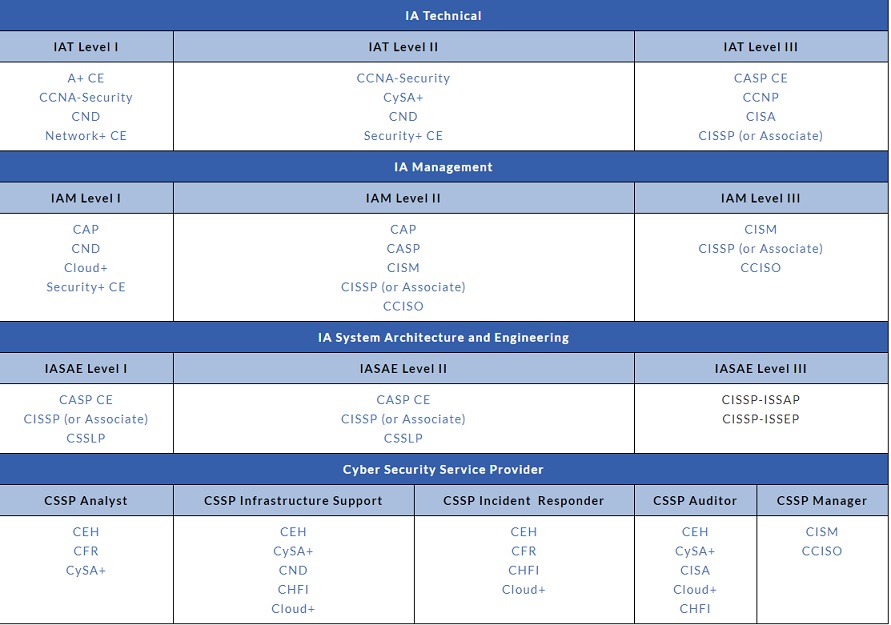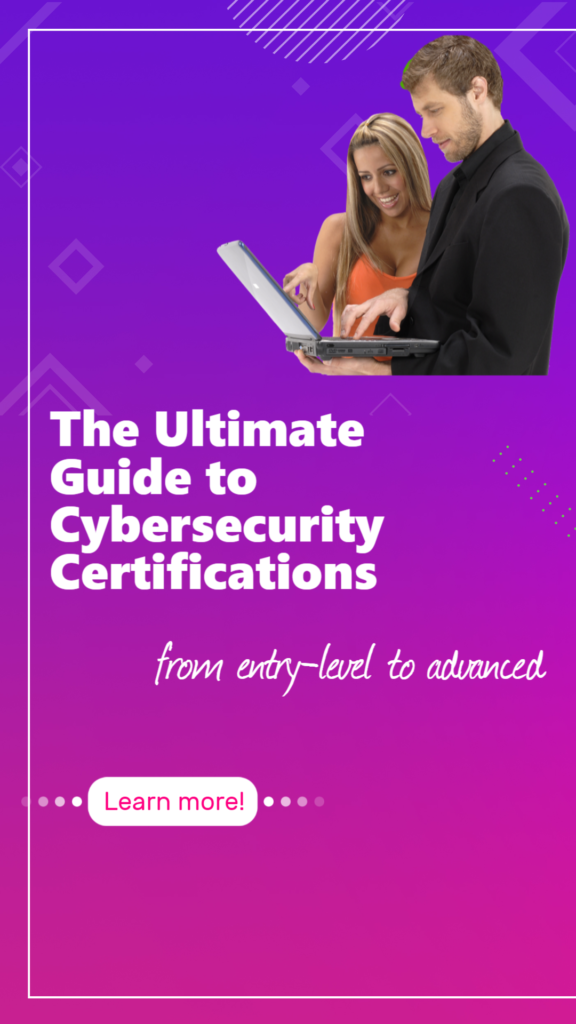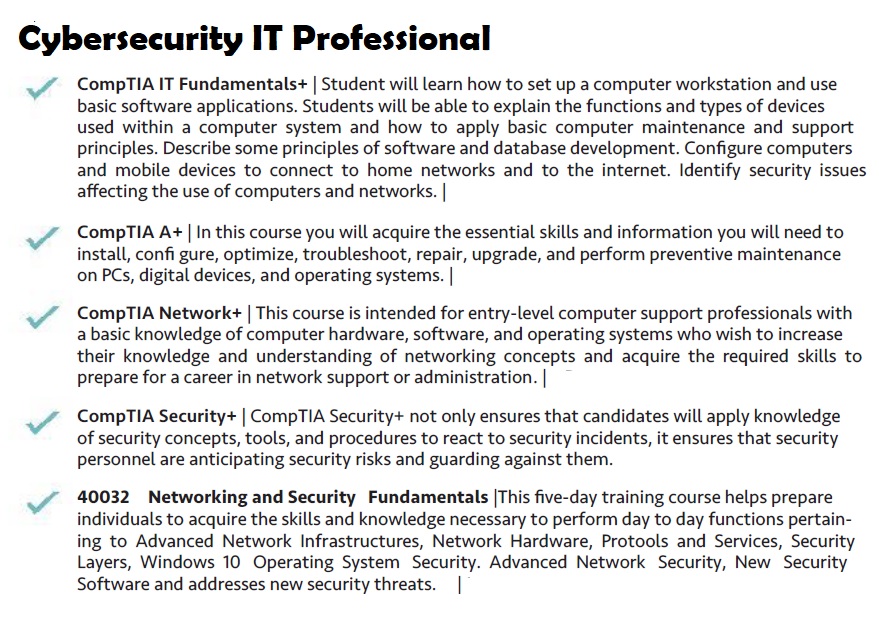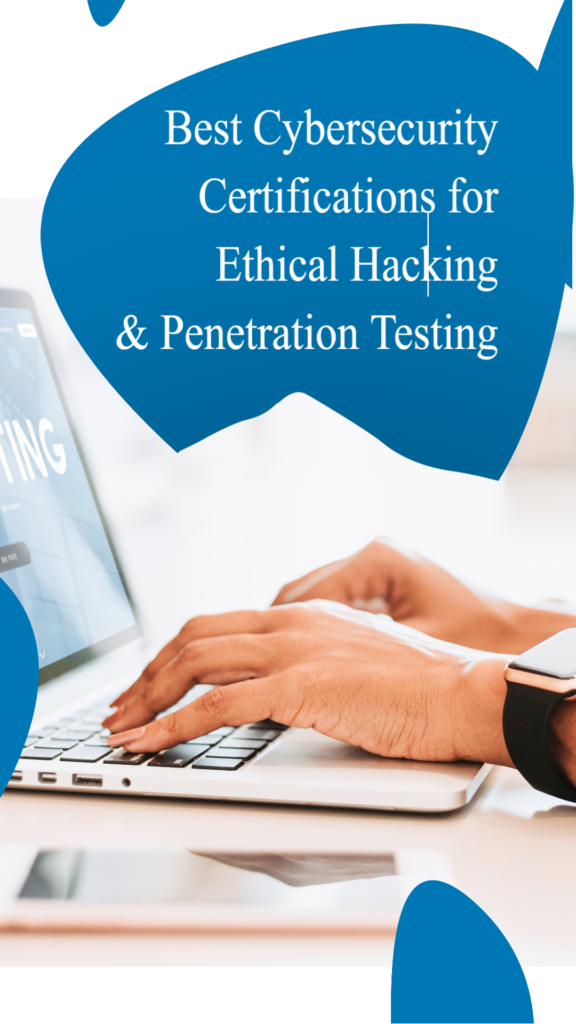Best Cybersecurity Certifications
Our new free eBook, Cybersecurity for Beginners is now available: Cybersecurity for Beginners
The demand for cyber security professionals is expected to grow by nearly 300% over the next decade. Security incidents and attacks from hackers are becoming more frequent. With so many jobs available, it can be difficult to know which certification training programs are worth your time and money to launch your career in cybersecurity. You can start a cybersecurity career with only a certification. Pass the Security+ certification exam and you will start getting recognition already. Whether you are entry-level starting your IT career with CompTIA IT Fundamentals or further progressed in your career and looking at an advanced certification in Ethical Hacking or Offensive Security, one of the best ways to help your career in the cybersecurity field is to get certified. That is because it is a field with high demand and low supply. One of the primary reasons cybersecurity is a sought-after field is because there is such a shortage of professionals who are qualified. According to cyberseek.org, there are currently over 700,000 job openings and the supply of qualified workers is very low.
Are you unemployed? You might qualify for a grant or a no risk program to get the certifications you need.
Table of Contents
Why Get Certified in Cybersecurity?

Do you need to be certified?
The demand for Cybersecurity professionals is very high and it can be difficult to choose the right cyber security certification(s) and know which exams to take. A report by Cyber security Market Report has shown that more and more jobs in cybersecurity are now requiring certification. DOD 8570 is a policy from the Department of Defense that was issued in February 2012. This regulation establishes a high level of certification for federal information systems along with designated authorizations for accessing classified information. This means that if you work in a position where you might have access to government data, then you must be certified. This is not just for people who work for the government, but also people working in the private sector. Nowadays, even companies that will never have access to government data are copying the ones who do and are requiring the same certifications. According to a recent salary survey, 70% of employees in cybersecurity said certifications were the most valuable for their career.
Careers in Cybersecurity
Here are just some of the job titles in this field:
IT Security administrator
Systems administrator
Help desk manager
Cybersecurity analyst
Network/cloud engineer
Network Administrator
Network Security Administrator
Security engineer/analyst
IT auditor
IT project manager
IT Security Officer
IT Security Consultant
Network Security Engineer
Application Security Engineer
Security Auditors
Cybersecurity Specialist

How much can you make in Cybersecurity?
One of the main reasons cyber security is a hot career opportunity is because there is such a lack of qualified workers, which means companies need to pay more to those who have the skills and certifications they need. Cyber security is a booming market in terms of demand, but the typical salary varies based on level of related experience, certifications, and region you live in. According to Ziprecruiter.com, as of June 24, 2022, the average annual earnings for Cyber Security in the United States is $112,974 a year. Most Cyber Security wages presently range between $60,000 (25th percentile) to $145,500 (75th percentile).


A guide to understanding cybersecurity certifications
Cyber security certification programs are designed to teach entry-level workers how to use certain tools and technologies. They validate your basic skills in cybersecurity. Certifications are also taken by people who have been in the industry for a long time. A certification in cybersecurity proves that they know what they are doing and validates their relevant work experience, but it also is a way to get new opportunities for advancement. Certification in cyber security is just as important as certification in other IT fields. Certifications are a way to showcase one’s previous experience, skills, and knowledge. As the demand for cyber security professionals continues to grow, the certification landscape will mature and become more competitive. Your career path may depend on choosing the right learning path to get the certifications you need.
There are tons of certifications for cybersecurity professionals to choose from. Instead of ranking them 1 -20 or whatever, I am using a different approach because I do not think that type of ranking has the most value. In the real world, you need to pick the ones that will do the most for your career which will vary depending on your needs and goals. To start with, if you are working in your field already, check with your employer to see which ones they need and will help you advance. If you get certified in AWS but your employer decides to only use Azure, it will not help you as much. If you need CISSP to get promoted, then anyone’s opinion saying CISM is better really does not matter.
Next, I recommend you determine which ones meet your needs depending on the cybersecurity roles you are seeking, where you are in your career, and how much hands-on experience in the field you have already. An entry-level person will have different needs than a security administrator who will look at more advanced topics. Someone doing ethical hacking might need to get their CEH certification or study offensive security. Depending on whether you want to specialize in security engineering, software development security, risk mitigation, healthcare information security, and administration Identity and access management, a managerial position or whichever path or security domain you choose will help determine which certification will be best for you. So, what I am going to do is show the best certifications based on where you are and what direction you want to go.
Lastly, if you are looking to work for the government or a company that does business with any government agency, then you should prioritize DOD 8570 certifications. If you work in a position where you might have access to sensitive government data, then you must have at least one of these certifications. Some sites mistakenly tell you that you only need one of these if you work for the government. That is simply not true. Private companies that have government contracts need these as well. Look at the chart if you are applying for one of these jobs.
Which Cybersecurity certifications should you get first?
If you want to get started in cyber security and have no experience, then you want to get your CompTIA Security+ certification. However, that is not entry-level. CompTIA themselves recommend you should either have the related experience or have already passed the exam for CompTIA A+ and CompTIA Network+. However, even those two can be challenging if you have no experience. if so, we recommend the following cybersecurity certification program: It contains CompTIA IT Fundamentals, CompTIA A+, CompTIA Network+, CompTIA Security+, and Cybersecurity Analyst (CySA) to give you the foundation needed to get your foot in the door. These are the five certifications you get in our Cybersecurity IT Professional program.
CompTIA IT Fundamentals
The CompTIA IT Fundamentals exam is an entry-level exam that allows you to show potential employers that you have some hands-on knowledge of the technology in the workplace. It offers an overview of computer concepts such as software installation, data transfer, data input devices, and output devices It also provides an understanding of security topics such as firewall protection/configuration and anti-virus installation/configuration.
Microsoft Network and Security Fundamentals
The Microsoft Network and Security Fundamentals course provides students with the knowledge to help you prepare for Microsoft Technology Associate Exams 98-366 and 98-367 and build an understanding of these topics: Network Infrastructures, Network Hardware, Protocols and Services, Security Layers, Operating System Security, Network Security, Security Software.
CompTIA A+
CompTIA A+ certification has become one of the most popular and recognizable IT certifications around, since it is a vendor-neutral credential that proves you have the foundational knowledge about computer hardware and software to work in the IT field, including the following areas: installation and configuration, diagnosing equipment, general system security, networking media, printers, and troubleshooting operating systems.
CompTIA Network+
This course builds on your existing user-level knowledge and experience with personal computer operating systems and networks to present the fundamental skills and concepts that you will need to use on the job in any type of networking career. The CompTIA Network+ certification has been described as “the entry-level gold standard for the information technology industry,” and it is designed to provide a solid foundation for IT professionals to build their careers. The Network+ exam tests a candidate’s knowledge of networking concepts and the hardware, software, and tools that are available to support network operations.
CompTIA Security+
The CompTIA Security+ certification covers a wide range of knowledge, including network security, access control, threat management, and much more. The course teaches an understanding of the principles of protecting an organization’s assets and data from outside threats.
Which Cyber security certifications should you get for Cloud Security?
If you are working in the field already, then focus on what your employer is using. In most markets, Microsoft Azure and AWS are the biggest. Of these two, while there is significant demand for both Azure and AWS certifications, there is far more demand for Azure security versus AWS. However, if your employer uses AWS, then focus on those.
For Azure:
You have some prerequisites, either from knowledge and experience or from certifications:
Azure Fundamentals
In this course, you will learn to create your first cloud service and database, move data with blobs and queues, use the Azure CLI to manage resources, and deploy your service to staging slots in Azure for testing. You will learn foundational level knowledge on core Azure concepts; core Azure services; core solutions and management tools; general security and network security; governance, privacy, and compliance features; Azure cost management and service level agreements.
Microsoft Azure Administrator Associate
The Microsoft Azure Administrator Associate certification program is designed to deliver the knowledge, skills, and abilities needed to successfully deploy and manage an application in Microsoft Azure. Students will learn how to manage their Azure subscriptions, secure identities, administer the infrastructure, configure virtual networking, connect Azure and on-premises sites, manage network traffic, implement storage solutions, create and scale virtual machines, implement web apps and containers, back up and share data, and monitor your solution.
Once you have the knowledge or above certifications, you are ready for this one:
Microsoft Certified: Azure Security Engineer Associate
Microsoft Certified: Azure Security Engineer Associate is an accreditation that demonstrates mastery of the competencies required to plan, deploy, and administer cloud infrastructure in Azure. The Microsoft Certified: Azure Security Engineer Associate program begins with the Microsoft Azure Essentials course, an introduction to Microsoft’s Cloud Platform. From there, this program includes two additional courses that dive into the concepts and best practices for securing your infrastructure in the cloud.
For AWS:
AWS Security Essentials
This course is an introduction to AWS and covers fundamental AWS cloud security concepts. This includes AWS access control, data encryption methods, which AWS services can be used for monitoring and incident response, and how network access to your AWS infrastructure can be secured.
Security Engineering on AWS
This course provides security engineering guidance for deploying an application or infrastructure in AWS. You will learn how to use AWS’s tools to deploy secure services, control access, manage secrets, detect threats, protect data with backup and encryption, audit logs and systems, and perform incident response using best practices. You will learn how to put it all together to build scalable deployments that are easier to maintain than traditional on-premises setups while still protecting your customers’ data.
You might wonder why I am not including AWS Certified Security. As popular as AWS is, we are just not seeing the demand in the US market. If there was, this would be offered more frequently. If you look at their website, it is only being offered once in the US between now and November 2021: Schedule for AWS Certified Security in the US In comparison, the Azure Security technologies certification class is offered far more often and fills up quickly. Out next two classes are already full.
Which Cyber security certifications should you get for Cybersecurity analyst or auditor roles?
I am including both analyst, auditor, and risk mitigation because there is often some overlap. Depending on your specific role, you should only choose what you need:
CompTIA Cybersecurity Analyst (CySA)
The CySA certification is one of the most recognized IT security certifications available on the market. It not only tests a candidate’s knowledge in cybersecurity but also how well they can apply that knowledge as they perform cybersecurity tasks. This is a great certification for those who work towards protecting data and keeping it safe from harm.
Certified Information Systems Auditor (CISA)
Certified Information Systems Auditor (CISA) certification will validate your experience as an auditor and make you stand out. In today’s business environment, it’s important to keep the company’s data safe by having the right security policies to deal with the various security issues that come up. Risk management training for auditors helps organizations stay compliant with regulations. The information that an organization depends on to be successful can be at risk from numerous sources. The CISA exam is a globally recognized measure of IT audit and control knowledge. By effectively managing audit processes, security controls, industrial control systems, security audit challenges, and other security aspects of the business, you will greatly contribute to the overall security of the organization.
CRISC Certified in Risk and Information Systems Control
The Certified in Risk and Information Systems Control (CRISC) is a certification that is highly relevant to information security professionals. It is part of the ISACA group of certifications and focuses on security and risk management, governance, and control. The class has been designed for IT professionals who are or who want to be in an IT risk management position. It is an important exam for those who work in risk management as it determines their ability to understand both IT systems and cybersecurity. You must meet the experience requirements to take this exam.
**Some DOD 8570 positions will ask for Certified Ethical Hacker (CEH) for certain auditor roles. I cover CEH under penetration testing.

Which Cyber security certifications should you get for penetration testing and ethical hacking?.
EC-COUNCIL Certified Ethical Hacker (CEH)
Certified Ethical Hacker (CEH) is one of the most sought-after certifications in Information Security. An Ethical Hacker is highly skilled professional who understands and knows how to look for weaknesses and security vulnerabilities in target systems and uses the same knowledge and tools as a malicious hacker, but in a lawful and legitimate manner. By learning different ethical hacking techniques, and testing different scenarios, you can determine which cybersecurity threats your organization may be vulnerable to. These professionals are hired and contracted by private companies or the government to do the same thing as a malicious hacker, but their purpose is to find the vulnerabilities before the malicious hacker.
CompTIA Penetration Testing (PenTest+)
Penetration testers are in huge demand. Penetration Testing is a form of vulnerability testing, which is the practice of analyzing a system to find out if there are any weaknesses that leave it susceptible to attack. In this case, the CompTIA Penetration Testing exam focuses on penetration testing and vulnerability assessment in an enterprise computing environment. Penetration Testing is a certified job skill that is becoming more and more important in the IT industry. It is a comprehensive test of the security of an IT infrastructure, using the same tactics used by a hacker. Penetration Testing (PenTest+) is a new certification from CompTIA which tests that you can successfully perform this task.
In the PenTest+ course, you will learn about the different penetration testing phases and how to analyze, document, and fix vulnerabilities in an IT environment. This course is recommended for those who are interested in becoming security testers.
EC-Council Computer Hacking Forensics Investigator
Computer hacking forensic investigation is the process of detecting hacking attacks and properly extracting evidence to report the crime and conduct audits to prevent future attacks. This program was developed for law enforcement and intelligence officials who investigate computer intrusions. Graduates of CHFI training can identify hackers and hidden electronic evidence, which can be used to bring down criminal enterprises and to prosecute hackers. You will learn how to collect and analyze evidence from computers, cell phones, and networks. You will also learn how to examine encryption, worms, and viruses.
Which Cyber security certifications should you get for managerial roles?
CISM (Certified Information Security Manager)
The Certified Information Security Manager (CISM) credential is a special certification for cyber security professionals. The CISM designation is designed to indicate that the holder will have the knowledge and skills necessary to design, engineer, and manage information security programs within an organization. This designation is respected by individuals and organizations alike. CISM Certification is a globally recognized measure of a person’s knowledge and ability in the field of information security management. It consists of a rigorous three-phase certification process that tests knowledge and abilities in various domains related to information security technologies such as risk assessment, incident response, organizational communication, and security topics.
CISSP – Certified Information Systems Security Professional
The CISSP is a professional certification for Information Security Engineers, Security Managers, or Security Analysts. It’s a globally recognized standard of excellence that not only validates your technical know-how in Security systems, asset security, security architecture, and other security domains but also demonstrates your commitment to the industry. CISSP is a vendor-neutral certification and is accepted by all organizations and companies worldwide. You must have previous experience in this field.
CompTIA Advanced Security Practitioner (CASP+)
This certification is an intermediate to advanced level certification. The CompTIA Advanced Security Professional (CASP) certification validates advanced knowledge and skills for experienced IT security professionals. Candidates for this certification are IT security practitioners with several years of experience in at least two of the areas of CompTIA Advanced Security Practitioner (CASP) objectives. Candidates for the CASP exam should possess experience in at least one of the following security domains: Penetration testing, Virtualization, Cloud Security, Risk Management, Security Operations, Identity Management, or Risk Management. CASP is somewhat of a hybrid. It is more technical than other management ones, but some positions want stronger technical knowledge as well.

Which Cyber security certifications should you get for Cisco?
I am putting Cisco in its own category because there is tremendous demand for Cisco specialists. Typically, you need to start with getting your CCNA first, then add either CBROPS and/or CCNP Security. Despite what some might tell you, CCNA is NOT an entry-level certification. You should have CompTIA Network+ first or equivalent knowledge.
Cisco® Implementing and Administering Cisco® Solutions v1.0 (CCNA)
CCNA Routing and Switching: Cisco Implementing and Administering Cisco Solutions v1.0 (CCNA) course will provide the student with all the necessary skills to install, operate, troubleshoot, and maintain a small branch office network for a company of any size. CCNA Routing and Switching: Cisco Implementing and Administering Cisco Solutions v1.0 (CCNA) equips learners with the knowledge to configure, implement, understand, manage and troubleshoot both IPv4 as well as IPv6 routing protocols across multiple layer 3 topologies in order to communicate effectively with remote sites in an ISP environment. Learners will also be able to identify basic networking security threats.
Cisco Understanding Cisco Cybersecurity Operations Fundamentals (CBROPS)
Cisco Understanding Cisco Cybersecurity Operations Fundamentals (CBROPS) is a Cisco-developed, Cisco-authorized training course that provides you with foundational knowledge and skills required for a secure and resilient IT infrastructure in your small- to medium-sized business (SMB) network. This course teaches you about Cisco Cybersecurity Operations, which is a framework that provides the information you need to identify, contain, and eradicate today’s most dangerous cyber threats. CBROPS will validate your understanding of how to detect and mitigate threats in networks and systems. This replaces the old Cisco Certified Network Associate Security. (CCNA Security)
Cisco® CCNP Security
CCNP Security is Cisco’s premier certification program for IT security professionals. It focuses in-depth on rapid growth domains such as network infrastructure protection, identity, and access management, security assessment and testing, wireless security, and more.
You will need to take:
Implementing and Operating Cisco Security Core Technologies (SCOR)
And any one of these Courses
Securing Networks with Cisco Firepower® Next Generation Firewall v1.0 (SSNGFW)
Implementing and Configuring Cisco® Identity Services Engine v3.0 (SISE)
Securing Email with Cisco® Email Security Appliance v3.0 (SESA)
Implementing Secure Solutions with Virtual Private Networks (SVPN)
Implementing Automation for Cisco Security Solutions (SAUI)
See if you Qualify for a WIOA Grant
Are you unemployed? There is a little known federal grant program that can pay for you to get trained, certified and placed in your career at no cost to you. Availability and amounts are based on where you live. If you qualify, this program can pay up to $10,000 to get trained, certified, and then get help getting placed in their career. The amount and availability vary by county
This can be used to get certified in fields such as Cyber-Security, Information Technology, Project Management, Business Analysis, and more. Some of the most highly sought-after certifications include CompTIA, Microsoft, Cisco, Project Management Professional (PMP), Scrum Master, and others.







